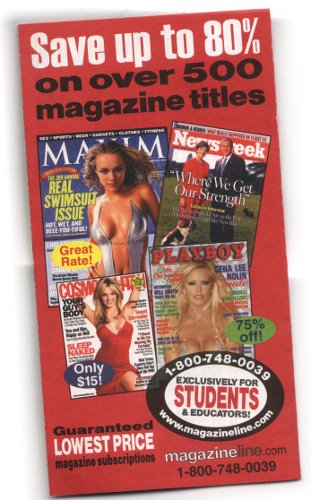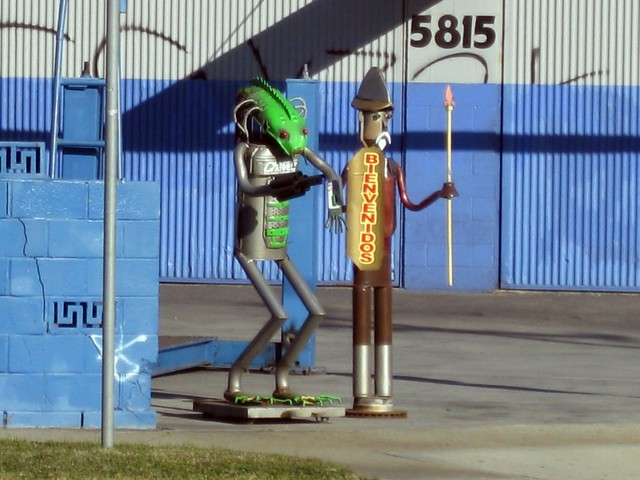Here’s my theory on LOST’s weird commercials: They figure that anyone still watching the show after this long doesn’t need to be convinced to watch the next episode, just told when it’s on. So they might as well have fun with it.
Tag: WTF
Car-Parts Predator and Soldier
WTF Reindeer Lady

Spotted in a storefront at the mall while Christmas shopping. Sorry about the image quality, but if you can see past the reflection, it’s a female mannequin with a reindeer’s head, wearing what appears to be a corset, a tutu, full-length gloves and a white beehive (hairstyle).
Gramma got mashed up with a reindeer?
Tori Amos vs. the Hulk
I never thought I’d see Tori Amos show up in a Marvel Comics comedy video starring M.O.D.O.K. — or that when someone started singing Christmas songs, it would be the Hulk.
From the M.O.D.O.K. Holiday Special.
Comic-Con Sellout
Absolutely floored that 4-day passes for Comic-Con International 2010 have sold out.
I mean, it’s the first week of November, and the convention isn’t until next July!
Tickets with access to Wednesday’s Preview Night sold out a few weeks ago, but at the time, CCI didn’t provide any information about how many regular 4-day passes were left. This Monday, they posted a progress gauge at 70%. The last time I looked yesterday, it was up to 89%.
Today? Sold out completely.
I can’t help but think it would have taken longer if they hadn’t provided a gauge to let people know just how scarce a resource memberships were going to be. There’s nothing like the fear of a shortage to get people to run out and buy up what’s available (and create a shortage). But I also can’t complain, because without that feedback, we might have kept putting off plunking down the $200 for the two of us, and we might have missed our chance.
Single-day tickets haven’t gone on sale yet, so it’s still possible to go if you haven’t already bought your tickets. You can of course buy more than one, it just means standing in line each morning to pick up the next badge. (Even the more relaxed WonderCon, run by the same organization, doesn’t let you pick up a Sunday badge on Saturday, as we discovered last year.)
If you’re planning on going to San Diego next year, keep an eye on the website. Four-day passes went insanely quickly, and I would expect the one-day passes to do the same.
Update 2019: Seeing how surprised I was is almost nostalgic, now that the entire con sells out within minutes every year. This was the tipping point.
Thoughts on #AmazonFail (or is that #SorryAmazon?)
At this point, the only (useful) official word from Amazon as to why thousands of books with LGBT themes disappeared from search results over the weekend is the “embarrassing and ham-fisted cataloging error” statement sent to Seattle Post-Intelligencer and other sources, also mentioning a number of other categories impacted. This article also has the unconfirmed word from former Amazon employee Mike Daisey that it was a matter of user error where someone mixed up some tags while working on the site, and the change just propagated globally.
Before Amazon finally spoke, tehdely posted an interesting theory that it might be might be astroturfing or a Bantown-style troll, deliberately pitting Amazon against the LGBT community to watch them fight each other for the lulz. A writer at Feministing asked her editor to call up Amazon and was told that it was not a glitch, but an automatic policy to hide “offensive” search results. Patrick Neilsen Hayden attributed it to bureaucratic incompetence.*
Now, some thoughts:
1. If this was intentional, on anyone’s part, it was both wrong (as discrimination) and stupid (as bad PR and as throwing away potential sales). If it was unintentional, it was still stupid.
2. Amazon really dropped the ball on PR. They should have responded much sooner (yes, it was a holiday weekend), and with something more detailed than “It was a glitch.” Something like, “We’re sorry, it was an unintentional error and we’re trying to fix it” would have gone a long way toward preventing the outrage from spiraling out of control. And we still don’t have anything more detailed than “ham-fisted cataloging error,” or (as has been pointed out) an apology to the authors and communities affected.
2a. And seriously, you’re an internet pioneer: use the Internet. You have email, you have official Twitter accounts, you have a space to put messages on your home page. Use them.
3. Twitter demonstrates that the internet is now fast enough and ubiquitous enough that people can develop a mob mentality without actually being in close proximity to one another. This includes not just people whipping each other into a frenzy, but people taking more permanent actions (deleting accounts) based on incomplete information.
4. No matter how many times something has been debunked (i.e. the “hacker” who claimed to have hacked the site), someone will see it who hasn’t seen the response and repost it as true. (You’d think I would have learned this from comics discussion forums by now.)
5. Canned responses from customer service are not authoritative statements of company policy. Half the time they’re not even answering the question you asked.
6. There are really two issues: (A) Adults-only books are being hidden from search results. (B) LGBT books were being misclassified as adults-only.
7. Combining #5 and #6, when a CSR monkey answers A, that’s not an official statement of policy on B.
8. Removing adults-only books from sales rankings is a dumb way to hide them from search results. Add a flag and let the user choose whether or not to include them like Google, Flickr, etc.
*The second-paragraph links were originally in a separate post, in the form of a collection of tweets. I’ve since combined the two into a single post.
I Read it for the Articles!
There’s something odd about this offer for magazine subscriptions.

They just don’t seem like a good fit for a student and teacher discount. Newsweek maybe, but…Maxim? Cosmo? Playboy?

